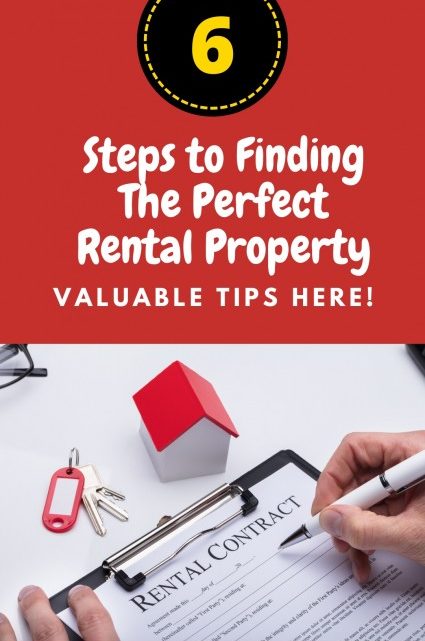How to Find a Rental Home
Buying a property can be risky business: there is tons of paperwork to complete, dozens of legal and financial aspects to cover, and even more long-term considerations to make before you slap your name on the final contract.
One would think renting an apartment or a house is a far more relaxed and more affordable option – but again, one would be terribly wrong. Nearly every property has its hidden downsides, which are quick to come to light as soon as you move in, so you should create a well-thought-out action plan when searching for your next temporary lodging.
You’ll find there is even more potential for issues when a landlord is renting out their home for the first time.
Here are six simple tips that can save you a lot of nerves and cash when renting for the long run.
Know thy budget – and stick to it
 Before you start looking for the next place to call home, one of the first things to do before searching for an apartment is making sure you can afford it! Lay down the total budget you can allocate for rent and utilities over the long term.
Before you start looking for the next place to call home, one of the first things to do before searching for an apartment is making sure you can afford it! Lay down the total budget you can allocate for rent and utilities over the long term.
As a general rule, a home should not cost you more than 30% of your monthly income, especially if you are renting out an unfurnished apartment as you will need extra money to get all the furniture necessary to make the place livable.
Also, do not forget to inquire about all the expenses that come with the place during the preliminary tour, such as the cost of repairs, parking fees, appliance replacements, and renovations. Landlords often do not mention these costs until it is time to cover them, and the obligation may easily wind up in your corner due to the absence of a previous arrangement.
Think outside the box of immediate costs and benefits when looking for a new place in order to keep your bases covered in the long run: the last thing you need on your hands is someone else’s plumbing or wiring going to shambles, landing the servicing bill right in your lap.
Know thy needs – and be realistic
Once you have figured out what kind of property you can afford, define your needs vs. wants, and see where you will be willing to compromise. A mantelpiece is a nice extra, but it is not essential to your temporary accommodation; bathtubs are an excellent place to wind down after a long day, but perhaps a home with a shower may be cheaper; a two-room semi-D may look cool, but do you really need all that space, or would a smaller house closer to your workplace or the downtown be a better option?
Do not get carried away by the sheer visual appeal: the features that make a home perfect are not spacious rooms, lavish bathrooms and flashy details, it is the overall state of the place, its sustainability, and suitability to your needs, not desires, so make sure you know the difference between those two.
Research, research, research
Another excellent tip for finding a rental property is doing your due diligence. After you schedule the preliminary tour of your future crib, you will need to research the neighborhood carefully. What services are available in the area? What about grocery stores, public transport, proximity to your workplace, healthcare centers and drugstores, parks, and other urban features you need close at hand? If you have kids, check the reputation of local schools and make sure your children would get quality education there.
Also, take a quick look at the neighborhood’s crime rates – it is always better to be safe than sorry. Some countries are known to be very safe for both families and solo travelers. Just to be safe, always strive to find a secure home located in a respectable neighborhood.
For instance, you can find studios for rent that take great pride in their security. Together with their functionality, all-inclusive rent, and comfy furniture, these apartments are perfect solutions for all. It’s also smart to look for spaces near shops, restaurants, and bars. High-class neighborhoods are traditionally much safer (and more pleasant for living), so if you have the opportunity to choose, choose smart.
Private or company-rented property?
Another aspect to cover in your property rental considerations is whether the property you set your eyes on is listed as belonging to a rental company or an individual. If the building is owned by a legal entity, make sure you check tenant impressions and ratings online and see if existing renters have any significant complaints about utilities, unsolved burglary cases, and the overall state of the property.
Seeing a few odd complaints about noisy neighbors or an occasional power cut is normal, but if you find one too many red flags such as frequent power failures or chronic plumbing issues, consider opting for private property or another rental company with a better reputation.
If you decide to rent out privately-owned apartments or houses, be very specific about who covers which costs, and if possible, get the landlord to sign a contract with you just to stay on the safe side, especially if you intend to stick around for over six months.
It is a sad fact of life: some landlords rent the flats they (or their family members) intend to move into at some point in the future, so you should legally protect yourself against potential eviction at short notice when your landlord’s son decides to tie the knot and move to ‘that flat my dad rents.’
Inspect the place scrupulously
Be meticulous when inspecting the property: signs of moss, roof leaks, exposed wiring, poor insulation and other common household issues can bring down the rent by a fine figure, and you also need to know the potential problems you are getting together with the place.
If you are renting out a house with a basement, start your inspection below the ground level: this is usually where early signs of plumbing issues or faulty supporting structures show, so do not disregard them if you are on the lookout for a place to call home for over a year.
Also, check the attic if the place has one: inadequate loft insulation can make your wallet squeal in agony come first snow and winter winds. Wall outlets and appliances should be safe and in working order – if you detect signs of moisture at the base of the walls where electrical wiring is placed, steer clear from the property.
Damp patches are quick to spread upwards and can, in some cases point to the presence of underground waters, lack of internal or external wall insulation, or even faulty foundation. A loose socket can be easily re-attached, but if the entire wall breaks out in wet spots, the property will soon become non-functional and potentially hazardous. Many people do not give much thought to having an inspection on a rental, but if the property is kind of run down, it may make sense to do so. For the cost of an inspection, it’s worth it.
When You Move Out
When you finally decide to move on from the home you have been renting it will be essential to document the condition so that you can get your security deposit back. Doing so will start by having a property condition form signed before you move in. The form will document any blemishes or problems with the home so you are not on the hook when your rental agreement ends.
Don’t forget about doing this. It is certainly one of the most vital steps in renting a home.
Final Thoughts on Finding a Rental Property
Ready, steady, go! Be careful when choosing your next rental home. However kind they may seem, landlords will not tell you that the house or apartment suffers from chronic droughts, faulty wiring, suspicious plumbing, or occasional dampness, so you have to figure these out on your own before it is too late. Define your needs and review your finances, then start searching for places within your budget.
When you narrow down your options to a few potential homes, do your own neighborhood background check and see which of the properties you listed works best for you. If possible, schedule a second home viewing and examine the place scrupulously.
Minor issues can be taken care of relatively quickly. Still, you should be aware that every rental property has its distinct weaknesses and that it is up to you to decide whether the home strengths are convincing enough for you to overlook the shortcomings. After all, you will live in that box for a while, and it needs to fit your bill, not the other way around.
Other Helpful Mass RE News Media
Get more valuable real estate guidance in these articles published at Massachusetts Real Estate News.
- Using a real estate agent or lawyer – should you use a real estate agent, lawyer, or both when selling a home? See a review of these options and what they mean.
- Managing your rent to save money – are you frugal or someone who spends money like it is going out of style? If you are the latter take a look at these tips on how to save some of your hard-earned cash.
About the author: The above article on the steps to finding a rental home was written by Chloe Taylor. Chloe is a graduated journalist from Adelaide and a regular contributor to Smooth Decorator. She loves everything related to real estate, decorating, and lifestyle topics. She is also passionate about photography.










No Comment